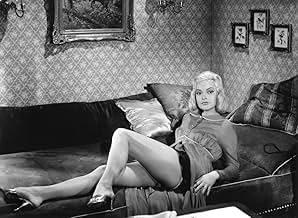Ajouter une intrigue dans votre langueWest Germany in '50s is becoming an economic superpower. In such climate, Rosemarie is just one of many enterpreneurs who wants her piece of new fortune. She uses her charms to bring members... Tout lireWest Germany in '50s is becoming an economic superpower. In such climate, Rosemarie is just one of many enterpreneurs who wants her piece of new fortune. She uses her charms to bring members of West German industrial elite to her bed. There she finds business secrets and later se... Tout lireWest Germany in '50s is becoming an economic superpower. In such climate, Rosemarie is just one of many enterpreneurs who wants her piece of new fortune. She uses her charms to bring members of West German industrial elite to her bed. There she finds business secrets and later sells them to French competition. However, when scandal errupts, Rosemarie would find that s... Tout lire
- Réalisation
- Scénario
- Casting principal
- Récompenses
- 6 victoires et 5 nominations au total
- Oelsen
- (as Tilo v. Berlepsch)
- von Killenschiff
- (as Erik v. Loewis)
- Kleye
- (as Hubert v. Meyerinck)
Avis à la une
movies I thought of Pretty Woman with a lot less emotion and entertainment
value. Since I was not very into the plot and action taking place on the screen I was very focused on the camera movements and angles. I am not a historian, but I felt like the car scenes were probably innovative. Especially during Rosemarie and Hartog's trip to the club for lunch when it went up and over he car.
My final comments on this movie, would be to go see, but don't expect to be
moved by the acting of engaged by the plot. See this movie to pick up on the camera techniques and angles.
caught up in the big money world of capitalism in the 50's. The title character is a resourceful, intelligent beauty who attempts to outwit morally corrupt
businessmen, and fails, losing her life. From the opening sequence which finds Rosemarie dancing below a hotel, "Das Mådchen" is full of vibrancy and life, containing an almost lyrical quality to the film. Singing is prevalent throughout the film, with Rosemarie's lowly
aquaintances providing social commentary with an accordion throughout the
movie. Along with this poetic quality, the film also finds strength through its stylish camera work. Full of extreme zooms and close-ups, the camera adds
real drama and a sense of urgency to the story. Nadja Tiller, as the call-girl Rosemarie, is electrifying, dominating the screen in every scene. Beautiful and resourceful, you never doubt her ability to outwit the West German
businessmen. The supporting cast is also very strong. As for weaknesses of the movie, the story does tend to drag along a bit, despite the music which is prevalent throughout. The main problem however,
is its hit you over the head method of displaying its message. The audience is constantly bombarded with messages of the ills of capitalism , most commonly displayed through the songs of Rosemaries friends , which are not-so-subtle
jabs at capitalism. While the merits of capitalism are certainly valid film topics, the constant barrage detracts from the movie. The story works on its own, and does not need the constant anti-capitalist messages. Stylistically, "Das Mådchen has echos of Hitchcock, with its dizzying camera work and morbid end. Despite this one major flaw, "Das Mådchen" is a colorful and enjoyable movie, complete with a tragic ending which lends an air of seriousness to the movie.
Conrad Adenauer lives on as one of Germany's great statesmen. He was responsible for the 'Wirtschaftswunder' (= German for 'the economic miracle', relating to West Germany's speedy recovery from the extensive damages of the lost Second World War). Adenauer rebuilt his country, and led it politically into the Western influence of the USA - making it a member of NATO.
However, in one respect Adenauer failed: he did not deal effectively with the many Nazi-sympathizers in his country. In particular with those in its leading circles. There were just too many of them, and their abilities could not be missed for the re-building of the West German economy.
It may be hard for Americans to appreciate, but 'Das Mädchen Rosemarie' is made special by this issue. The film emphasizes on the bankrupt moral state of mind of these business leaders - their former involvement with Adolf Hitler and his Nazi's is clearly written on their foreheads. In this respect this film's main theme, prostitution, connects very well.
'Das Mädchen Rosemarie' even makes a historical document. I know of no other film dealing in such a clear, sharp and ruthless way with Germany's big post-war moral dilemma. A dilemma vanished by now, for the vast majority of these Hitler-infected leaders have died.
The film is a cynical comment on the German economic miracle after the Second World War, in the film referred to as "das Wirtschafts-wunderland". The self pronounced heroes of this miracle, the capitalists, are less a role model than they pretend to be.
Two petty criminals, with whom Rosemarie formed a vaudeville group before her "career", comment on the plot in the form of cynical songs. The film assumes thereby a Brechtonion character, sort of a "Drei Million Grochen Oper".
Rolf Thiele was a German director active from 1951 to 1977. His films are mostly sex comedies and mediocre at best. "Das Mädchen Rosemarie" is one of the best, although still not a top movie. In 1976 he made a (far worse) sequel about the daughter of Rosemarie with "Rosemaries Tochter".
Le saviez-vous
- ConnexionsReferenced in Rosemaries Tochter (1976)
Meilleurs choix
Détails
- Durée
- 1h 45min(105 min)
- Couleur
- Mixage
- Rapport de forme
- 1.33 : 1



















